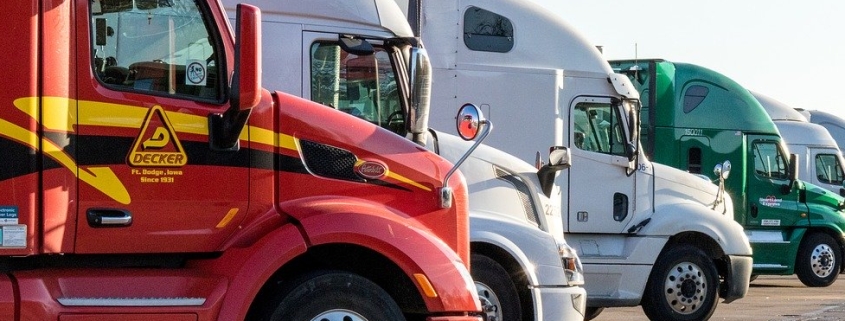Tax season may not be your favorite time of the year, but it also shouldn’t be something you’re afraid of. As a truck driver, there are a number of tax deductions that you could be taking advantage of this year. Here are those deductions, plus the three golden rules of filing taxes.
The money you spend for work on the road might increase the money you get back from taxes. So, keep a careful record of any costs you have that are job related. Staying organized might bring you a big payoff in your taxes. Remember, if you have any questions or doubts, ask a professional.
The Trucker’s Report made this list of trusted sources who know trucking. Many tax companies offer a first free conversation that can clear up your concerns. You can also use services like Turbotax or H&R Block to make filing easier. Let’s get started.
Step 1: Find your Form
If you are a company driver, you can no longer claim work-related deductions on your taxes. This is thanks to changes to the tax code made by the Tax Cuts and Jobs Act a few years ago.
If you are an owner operator, you’ll need the 1099 forms that your customers should have sent you to fill out your Schedule C. This is where you fill out your income and expenses from the last year. If you made the leap to become an owner operator, it’s important to stay very organized. This form allows you to carefully itemize the costs of your work and deduct them from your taxes. That’s money back in your wallet!
Step 2: Save Money with Truck Driver Tax Deductions
This is the good stuff. Claiming work-related tax deductions is important. It reduces your adjusted gross income, and that means you pay less in taxes.
Here’s how it works: John makes $75,000 annually as an owner operator (his “gross income”). He is able to claim deductions for licensing fees and other work expenses that total $6,500. Since John already paid $6,500 for these expenses and wasn’t reimbursed, he can subtract $6,500 from his total income. Now, John only pays taxes on $68,500 (his “adjusted gross income” or AGI).
A lower adjusted gross income means you pay less in taxes. You report your gross income and then calculate your adjusted gross income on your tax forms, but only the adjusted gross income is taxed.
Now, let’s find those truck driver tax deductions!
Key Non-Deductible Expenses
We’re all for saving money, but there are a few common costs that are NOT deductible. Drivers are NOT allowed to deduct the following things from their annual income.
- Expenses reimbursed by your employer
- Clothing that can be adapted for everyday wear
- Commuting costs to the company headquarters. However, many companies WILL reimburse for commuting costs to the truck yard. If you’re not sure, ask your company.
- Home phone line
- Owner Operators CANNOT deduct the time spent working on their equipment
- Owner Operators CANNOT deduct the income lost as a result of deadhead/unpaid mileage. But, Owner Operators CAN deduct the expenses incurred to operate the truck during that time such as fuel, tolls and scales. etc.
- Owner Operators CANNOT deduct for downtime
The 9 Deductions You Should Consider
1. Cell Phone Plans & Internet fees

No driver spends a significant amount of time on the road without using their phone and internet a lot. Luckily, the IRS agrees. Since most drivers use their phone for both personal and professional purposes, you are allowed to deduct 50% of your phone and internet costs. You can also deduct the entire cost of a new phone or laptop that you bought this year. Communication and technology costs add up and now you can show it in your taxes!
2. Medical Exams

Did you see a doctor for a work-related issue? Deduct the out of pocket cost! Normally medical expenses are not tax deductible, but in this case, they are actually considered business expenses. Your health is a top priority, and it’s nice to have that recognized during tax season.
3. Licensing Fees

Any costs that you pay to get and maintain a CDL license can be claimed!
4. Food on the Road

Drivers who spend long hours on the road are allowed to deduct food expenses from their taxable income. The IRS understands that you’re spending a lot of time behind the wheel and food costs add up! Drivers are allowed to deduct either a per diem amount (this varies based on where and when you drive) per day from their annual income. The other method is to keep your receipts from each time you buy food. When tax time comes, you’ll be able to deduct 80% of what you paid in meals for the year. Local drivers are not allowed to deduct food costs because you are able to eat at home after your route is complete.
5. Truck Repairs/Maintenance

Any expenses you paid to repair or maintain your truck that were not reimbursed can be claimed! Cleaning and maintenance costs are also deductible. This could include truck parts, cleaning supplies, etc., but NOT the cost labor if you repair the truck yourself.
6. Association Dues

Most drivers are required to be part of a union or other collective trucking group. Any required fees to take part in these groups are deductible. If you are part of additional trucking groups, you may still be able to deduct the cost. You can claim this deduction if you can demonstrate that it helps your career or is a regular membership in the trucking industry.
7. Personal Products

Personal products are typically the small purchases (that really add up!) that are necessary on the road. It could include food storage (think a cooler), logbooks, a flashlight, specialized clothing, electronic equipment you need for the road (ex. A GPS), and much more. Keep careful track of all these little expenses because they add to a big total, and you can deduct them on taxes!
8. Fuel & Travel Costs

If you own your own truck, you can claim the exact number of miles you drove on the job. You can also claim vehicle related costs including maintenance (see above), insurance premiums, and loan interest.
9. Non-Trucking Standard Deductions

In addition to the specific deductions you get to claim as a trucker, don’t forget about the common deductions that aren’t related to your work. These could include things like child tax credits, lifetime learning credits, and child or dependent care among other things.
Step 3. File before April 15
It’s time. You’ve added costs and finished the paperwork. You’ll know by the time you submit your forms whether you need to send a check or will be getting a refund. You can file your taxes electronically or by mail as long as they are submitted by April 15.
And with that, kick back and relax! Your taxes are done for another year!
Looking for a new CDL Job?
Drive My Way matches you with a job based on your preferences like pay, home time, touch level, and more.




